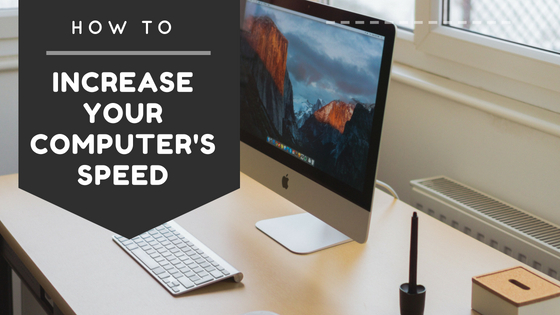The performance of a computer is directly attributed to the speed at which it executes files and performs the user’s other commands. Whether it’s a Mac or Windows PC, sluggish speeds make otherwise simple tasks like browsing the internet, editing photos, and playing games painfully difficult. If you use your computer for work, it’s even more frustrating! However, there are ways to increase a computer’s speed, including the following tips.
Free up storage space
The first step to speeding up a slow computer is deleting unnecessary files from the hard drive. Most computer technicians recommend users have at least 15 percent of their hard drive’s total space free. When hard drives approach their maximum capacity, the computer may struggle to access files.
Move large files to the cloud
Users should consider moving large files, such as photos, videos, and media-rich PowerPoint presentations, to the cloud. This not only frees up storage space, but it also allows users to access their files from anywhere. When a file is stored on the cloud, users can access it over the internet from any computer. Cloud storage is a lot more preferable to storing the files on your computer.
Defrag hard drive
It’s always a good idea for users to defrag their hard drive after deleting or adding a significant number of files. Also known as defragmentation, it involves the use of software to consolidate relevant data so that the computer accesses it more quickly. A defrag tool brings bits of data associated with a file closer together. This means the computer doesn’t have to scan vast areas of the hard drive when searching for or executing files.
Reduce the number of startup programs
When a computer boots up, it typically launches several programs. Some of these programs are essential to the computer’s operating system. Others are not, however, and should be disabled to prevent them from negatively affecting the computer’s performance. In Windows 8 and Windows 10, users can disable startup programs by accessing the Task Manager.
Scan for malware
Finally, users should scan their computer for viruses, Trojans, ransomware, and other types of malware. Even if there are no signs of malware present, a computer could be infected. Crypto-mining malware, for example, hijacks the victim’s computer and uses its resources to mine cryptocurrency. Proactively scanning for and removing cyber threats allows for faster speeds and better performance.
It’s frustrating when a computer fails to respond to commands in a timely manner. By performing these tips, however, users can achieve faster speeds with their computer.
